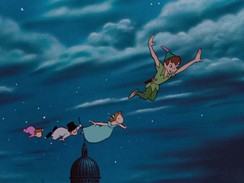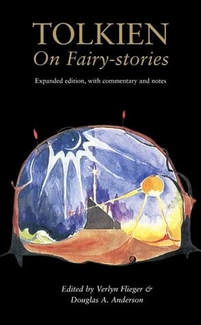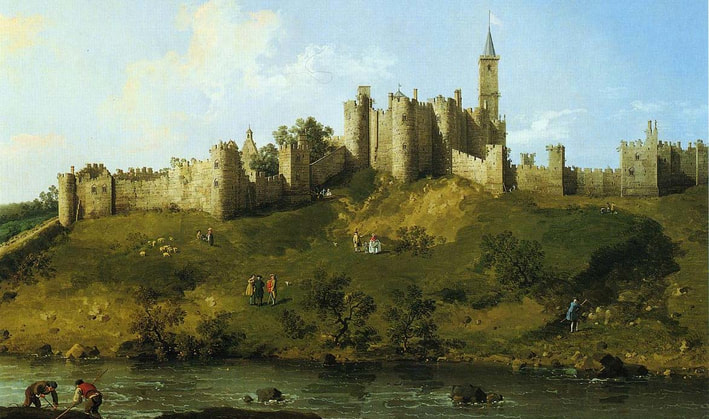|
Have you noticed something? Fantasy has gone mainstream. What was once a genre only acceptable for a select group of people on the fringes—the eccentrics, the nerds, the gamers, the binge-readers, etc.—is now all of a sudden widely popular. People are glued to their screens watching Game of Thrones, Supernatural, and Once Upon a Time. Amazon is developing a new Lord of the Rings series and Netflix has taken the reins of The Chronicles of Narnia. Meanwhile, this year the Harry Potter books passed the 500 million mark in copies sold.

Fantasy is no longer one of literature’s best kept secrets. Maybe we’ve come to realize that these kinds of stories aren’t just for children. Adults can enjoy them too. I grew up reading fantasy books. Like you, perhaps, I was guided by the wisdom of Gandalf and heeded the warnings of Galadriel. I followed along with Lucy as she stepped through the wardrobe into Narnia and with Wendy as she sailed into Neverland. These stories have stayed with me. And I’ve only gone looking for more such adventures since then.
Why do we love fantasy? What drives us to come back to it again and again? It might help to think about what we mean by the word fantasy. In everyday conversation the word can have an unhealthy connotation. It denotes something we think about continually but which is very unlikely to happen. Fantasizing denies what’s real. And it can cause real-world problems. For example, you might fantasize about gambling your way into financial success, and then lose everything. Or your co-worker might be convinced that, despite all evidence to the contrary, you're looking to take over their job. Fantasizing can lead us astray when we refuse to believe our eyes and ears.
But the fantasy genre is different, or at least it should be. Fantasy books are about truth. They aim to transport readers to an unfamiliar context where new light is shed on truth which transcends that context. Of course, all fiction takes place in an imaginary world. In a sense all made-up stories transport us somewhere new. But fantasy takes it a step further. In fantasy you can enter a world where animals can talk, people wield special powers, and towering creatures roam free across the landscape. You are transported to this Otherworld where the impossible becomes reality before your very eyes.
As readers we get excited and inspired when we enter such fantasy Otherworlds. One particular 19th century author, George MacDonald, influenced a host of later authors, such as Madeleine L’Engle, C.S. Lewis, E. Nesbit, and J.R.R. Tolkien. MacDonald wrote a number of fantasy classics, including Phantastes, for which this blog is named. The book’s title evokes the wondrous and peculiar paths that await those willing to embark on its adventures. It invites us to enter Fairy Land, if we dare. MacDonald’s enchanting stories helped to create what we understand today to be the genre of fantasy literature. We are drawn to fantasy books because they are, if you’ll allow me to repeat myself, fantastic. The word fantasy has come to mean dragons, fairies, and elves, while the word fantastic has come to mean something good and exciting. And we’ve lost sight of how they’re related. When someone says the surfing yesterday was fantastic, how many of us imagine a couple of dragons riding the waves? But despite how the words’ definitions have diverged, I think it’s perfectly appropriate to think of the fantasy genre as fantastic. The best fantasy books don’t just transport us anywhere. They transport us somewhere good and exciting. That doesn’t mean that place isn’t going to be dangerous or challenging. Surfing is both. But, just like reading fantasy, it is also very rewarding. 
Some have leveled the criticism that fantasy is merely escapist and meant to distract us from the real world we live in. To shut our eyes to the trials of life is self-defeating and cowardly, they say. But I don’t think that’s what good fantasy authors do. Reading fantasy is like an escape, certainly, but of a different kind. In his essay “On Fairy-stories,” J.R.R. Tolkien differentiates between “the Escape of the Prisoner” and “the Flight of the Deserter.” The prisoner recognizes his fall and seeks to restore himself. In doing so, he is freed from his shame. The military deserter denies his duty and loses his place of honour and distinction. He is freed from his post. According to Tolkien, the good fantasy author is like the prisoner who recognizes that the world is full of problems and longs for restoration and renewal. They escape our dark world in an attempt to find something better and brighter. Rather than being cowardly, this kind of escape is an act of bravery.
And that’s borne out in Tolkien’s fiction. Imagine if Frodo Baggins played the deserter and had stayed in the Shire, ignoring the problems of the wider world. Imagine if Aragorn had shunned his responsibility. There would be no “return of the king.” Rather than blinding us to the darkness of this world, fantasy reveals evil to us in all of its power. But it also reveals that evil can be beaten, often in an unsuspected way. Another world is possible. There is hope, if only a fool’s hope. The fantasy author cannot despair because, like Gandalf says, “despair is only for those who see the end beyond all doubt. We do not.” Our reality can be transformed. Thus good fantasy is not cowardly blindness. Rather, it casts a vision of courage. I hope this blog helps to further the conversation about what makes good fantasy literature. My aim is to thoughtfully analyze such texts with discernment, but also to explore them with the same openness that we might have had when we were children. A child doesn’t know everything yet. They are dependent, not self-sufficient. When a child enters a fantasy world, they bask in the opportunity to learn about and experience what they’ve never known before. That’s when the magic begins to work. And it’s where our journey finally gets off the ground—with discernment on the one hand, and on the other, hope.
Comments
|
David Raphael HilderJoin the conversation as we explore the best there is in fantasy, sci-fi, adventure, and of course, the classics Archives
December 2020
Categories
All
|


